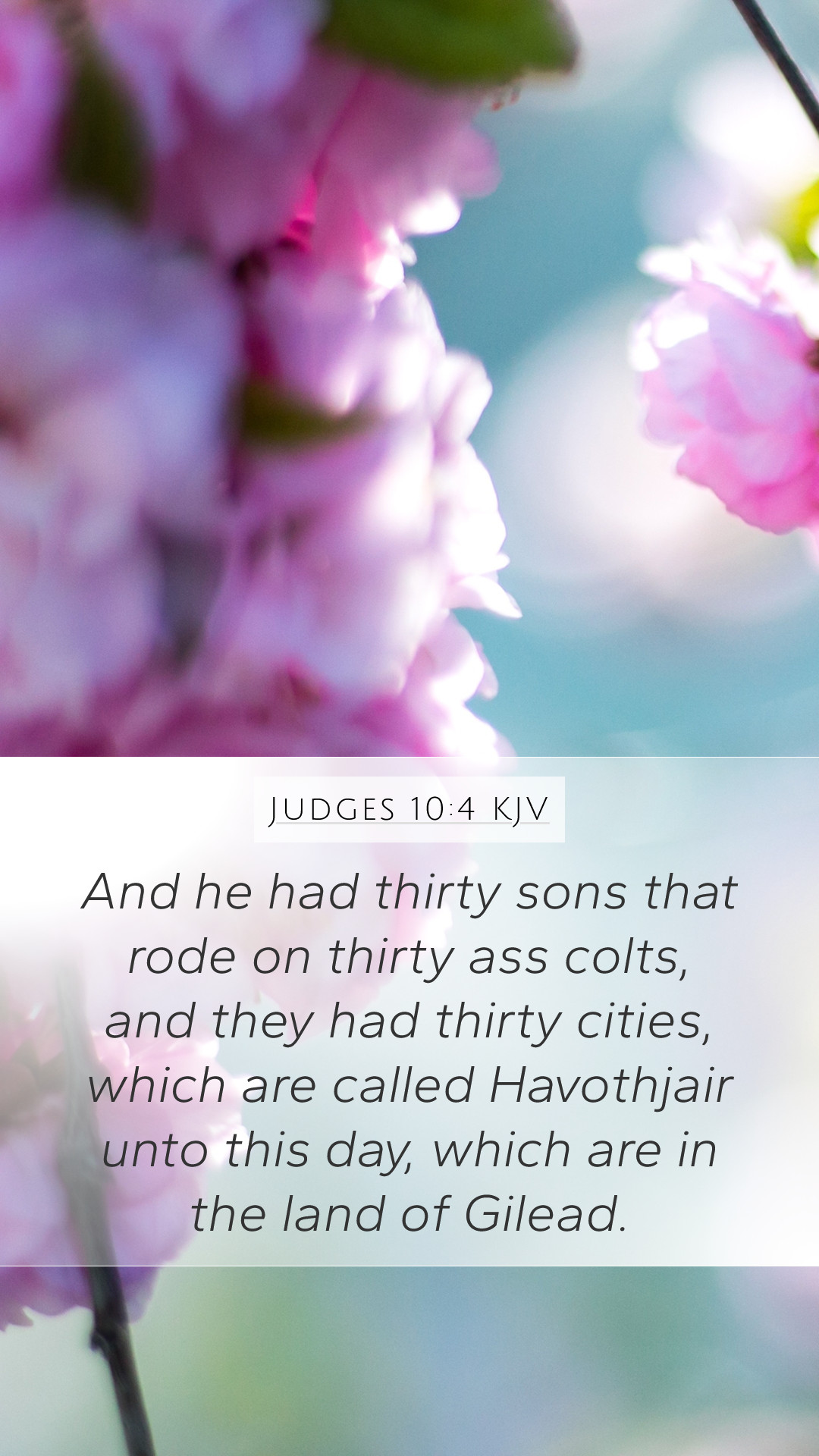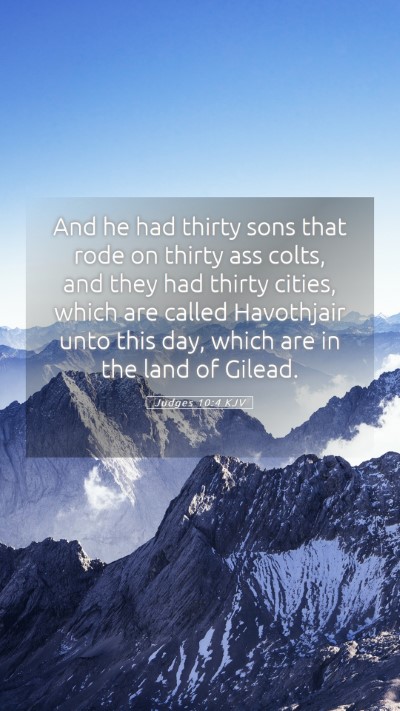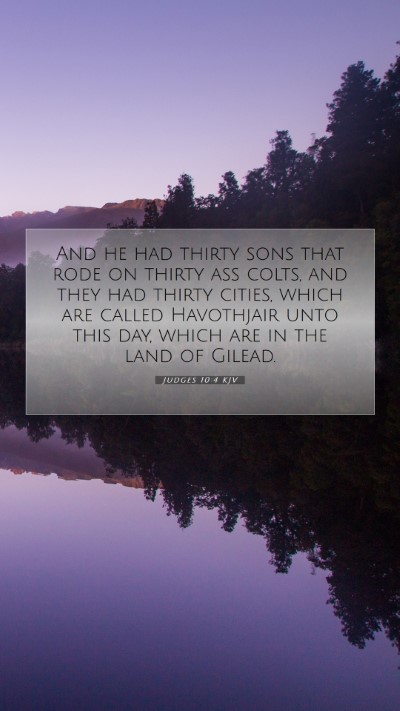Old Testament
Genesis Exodus Leviticus Numbers Deuteronomy Joshua Judges Ruth 1 Samuel 2 Samuel 1 Kings 2 Kings 1 Chronicles 2 Chronicles Ezra Nehemiah Esther Job Psalms Proverbs Ecclesiastes Song of Solomon Isaiah Jeremiah Lamentations Ezekiel Daniel Hosea Joel Amos Obadiah Jonah Micah Nahum Habakkuk Zephaniah Haggai Zechariah MalachiJudges 10:4 Meaning
What is the meaning of Judges 10:4?
And he had thirty sons that rode on thirty ass colts, and they had thirty cities, which are called Havothjair unto this day, which are in the land of Gilead.
Judges 10:4 Bible Verse Meaning
Bible Verse Commentary: Judges 10:4
Verse: Judges 10:4 - "And he had thirty sons that rode on thirty ass colts, and they had thirty cities, which are called Havothjair unto this day, which are in the land of Gilead."
This verse presents an insight into the life of Jair, a judge of Israel, highlighting his wealth, influence, and the legacy of his family within the region of Gilead. The phrase "thirty sons" emphasizes his prosperity and the notable status he held in society.
Meaning and Analysis
The complexities of this verse can be unpacked through various lenses provided by public domain commentaries.
- Matthew Henry Commentary:
Matthew Henry reflects on the significance of Jair's numerous sons, symbolizing both abundance and social standing. The riding of the ass colts suggests a position of honor and the fulfillment of patriarchal duties, as sons would function as heirs and protectors of their father's legacy. The mention of the cities named after Jair indicates his substantial impact in establishing a safe and recognized community. The cities of Gilead were known for their pastoral beauty and strategic significance, which reflects God's providence in strengthening the borders of Israel through leaders like Jair.
- Albert Barnes Commentary:
Albert Barnes emphasizes the socio-political implications of Jair's leadership. By having "thirty cities," Jair not only showcased his personal wealth but also his leadership capacity in organizing and governing these regions. The reference to "ass colts" aligns with traditions of nobility, suggesting that his sons were not merely family but representatives of a significant lineage tasked with maintaining peace and order in Israel during tumultuous times. The enduring legacy of these cities further illustrates how leadership and governance extend beyond one's lifetime, meriting attention in discussions of biblical leadership and stewardship.
- Adam Clarke Commentary:
Adam Clarke provides an understanding of the historical setting of Jair’s judgeship. He points out that the 'Havothjair' refers to a series of settlements or villages, which indicates not just individual cities but an entire network that functioned under a singular authority during a time of tribal affiliation in Israel. Clarke also points out that the number of colts and cities may symbolize abundance in different aspects of life—spiritual, material, and communal. This commentary invites readers to consider the broader implications of obedience to God, prosperity, and divine favor as reflected through Jair's tenure.
Applications and Reflections
Understanding Judges 10:4 incorporates more than just its surface narrative. It urges readers to reflect on the lessons of leadership, community organization, and the importance of leaving a generous inheritance for future generations.
- Leadership Qualities:
The success of leaders often manifests not just in their achievements but also in the legacy they cultivate. Jair's leadership provides practical insights into how individuals can influence their communities positively.
- Faithfulness and Prosperity:
The verse sparks conversations about the connection between one's faith and overall success, drawing upon broader biblical principles where God blesses faithfulness, often resulting in tangible blessings.
Cross References
- Judges 10:1-2: Discusses the leadership of Tola, setting up a thematic framework for the judges of Israel.
- 1 Samuel 12:11: Points to the system of judges in Israel and captures similar leadership qualities.
- 2 Samuel 20:1: Features the societal structures and conflicts arising in the turbulent era of the judges.
- Judges 5:16: Provides context on the significance of locations and duties, reflecting on the responsibilities of leaders.
- Deuteronomy 19:1-3: Discusses the establishment of cities of refuge which complements the role of leaders like Jair in maintaining justice and safety.
Further Studies
For those engaged in Bible study groups or online Bible study, Judges 10:4 offers an in-depth discussion centered around concepts of wealth, community, legacy, and leadership in biblical history. Here are some insightful areas to explore:
- The role of judges in ancient Israel and their societal impact.
- Analyzing the significance of names and places in the Old Testament.
- Understanding the cultural implications of wealth and family in biblical narratives.
Conclusion
Judges 10:4 presents a multifaceted understanding of leadership, wealth, and legacy within the biblical context, inviting reflection on personal application in today’s life. Engaging with this verse through various commentaries and analyses enhances one's grasp of Scripture, enriching both Bible study insights and personal spiritual growth.


